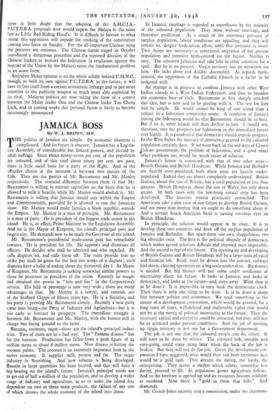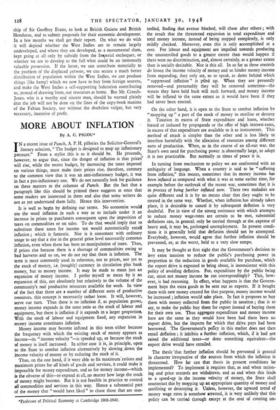JAMAICA BOSS
By W. J. BROWN, M.P.
THE politics of Jamaica are simple. Its economic situation is complicated. And its future is obscure. Jamaica has a Legisla- tive Assembly, of considerable but limited powers, and elected by adult suffrage. Since about ninety-seven per cent. of the population are coloured, and of this total about ninety per cent. are poor, there is little social basis for a party of the Right. And so the effective &mice at the moment is between two parties of the Left. They are the parties of Mr. Bustamente and Mr. Manley respectively. The essential difference between them is that Mr. Bustamente is willing to tolerate capitalism on the basis that he is allowed to milk it heavily, while Mr. Manley would abolish it. Mr. Bustamente is willing that Jamaica should stay within the Empire and Commonwealth, provided he is allowed to run the Jamaican show. Mr. Manley would make Jamaica a black republic, outside the Empire. Mr. Manley is a man of principle. Mr. Bustamente is a man of parts. He is president of the biggest trade union in the island. He is, in effect, Prime Minister in the Legislative Assembly. And he is the Mayor of Kingston, the island's principal port and largest city. He demands now to be made the Governor of the island.
Mr. Bustamente's presidential trade-union post has remarkable features. He is president for life. He appoints and dismisses all officers. He decides who shall be admitted and who expelled. He calls disputes on, and calls them off. The rules provide that no strike pay shall be given for the first two weeks of a dispute ; such disputes have a habit of ending about the thirteenth day 1 As Mayor of Kingston, Mr. Bustamente is seeking somewhat similar powers to those he possesses as president of the union. Recently he sought and obtained the power to " hire and fire " in the Corporation's service. His field of patronage is now very wide ; there are many advantages in that. Mr. Manley is a lawyer, and reminds one of the Stafford Cripps of fifteen years ago. He is a Socialist, and his party is pressing Mr. Bustamente closely. Recently a new party came into being—the Party of Industry and Agriculture—but it is too early to forecast its prospects. The immediate struggle is between Mr. Bustamente and Mr. Manley, with the former still in charge but losing ground to the latter.
Bananas, coconuts, sugar—these are the island's principal indus- tries. Two of them Are in a bad way. The " Panama disease " has hit the bananas. Production has fallen from a peak figure of 22 million stems to about 6 million stems. Now disease is hitting the coconut palms. The coconut is an extremely important item in the native economy. It supplies milk, protein and fat. The sugar industry is flourishing. And now tobacco is being developed. Bauxite in large quantities has been located, and this will have a big bearing on the island's future. Jamaica's principal needs are to get rid of half a million of the population, and. to develop a wider range of industry and agriculture, so as to make the island less dependent on two or three main products, the failure of any one of which throws the whole economy of the island into chaos.
In Jamaica, marriage is regarded as superfluous by the majority of the coloured population. They mate without marriage, and thereafter proliferate. As a result of the enormous pressure of surplus population, labour conditions are appalling, and they will remain so, despite trade-union effort, until this pressure is eased. Two things are necessary—a substantial migration of the present population and intensive birth-control for the future. Neither is easy. The coloured Jamaican will take jobs in other countries for a spell. But he is no pioneer. Virgin territory has no attraction for him. He lacks drive and dislikes discomfort. As regards birth- control, the opposition of the Catholic Church is a factor to be reckoned with.
An attempt is in progress to combine Jamaica with other West Indian islands in a West Indian Federation, and thus to broaden the economic base of each. Bustamente at first sharply attacked this idea, but is now said to be playing with it. The test for him will be simple. He would sooner be king of one island than a subject in a federation comprising many. A condition of Jamaica joining the federation would be that Bustamente should be its boss. But if he is, other islands will then decline to join. I should not, therefore, rate the prospects for federation in the immediate future very highly. It is paradoxical that democracy should impede progress. In the West Indies the measure of democracy granted to the coloured population certainly does. If we were back in the old days of Crown olony government, the problem of federation, and a good many other problems too, would be much easier of solution.
Jamaica's future is connected with that of two other areas— British Guiana and British Honduras. While Jamaica and Barbados are heavily over-populated, both these areas are heavily under- populated. Indeed they are almost completely undeveloped. British Guiana, about the size of Britain, has a total population of less than 400,000. British Honduras, about the size of Wales, has only about 40,000. In both cases only the low-lying coastal strip has been developed. The interiors remain practically untouched. The Americans take a dim view of our failure to develop British Guiana, and are more than hinting that we ought to do something about it. And a certain South American State is casting covetous eyes on British Honduras.
In principle, the solution would appear to be clear. It is to develop these two countries and draw off the surplus population of Jamaica and Barbados. But apart from our own sluggishness, two big obstacles exist. The first is the political obstacle of democracy, which makes agreed solutions difficult and imposed ones impossible. And the second is fear of the future. The opening up and developing of British Guiana and British Honduras will be a large-scale physical and financial job. Roads must be driven into the interior, railways laid down, clearing operations on a big scale undertaken. Big finance is needed. But big finance will not come under conditions of uncertainty about the future. It looks at Jamaica, and looks at democracy, and looks at the future—and stays away. What then is to be done ? It is impossible to turn back the democratic clock. Then there is only one thing to be done. It is to draw a sharp line between politics and economics. We need something in the nature of a development corporation, which would be granted, for a long term of years, well-defined and inalienable rights that would not be at the mercy of political uncertainty in the future. Then the necessary capital and enterprise could be attracted, but they will not be so attracted under present conditions. And the job of opening up virgin territory is not. one for a Government department.
The job is not one that the coloured people can do, either. It will have to be done by whites. The coloured folk, amiable and easy-going, could come along later when the back of the job is broken. But they will not do the job. Given the development cor- poration I have suggested, what would then suit both territories best would be a 'gold rush. That attracts the daring, the hardy, the enterprising. They create a market which others, somewhat less daring, proceed to fill. As population grows agriculture follows. And so the territory is opened up and its resources become available to mankind. Now there is " gold in them than hills." And diamonds.
Mr. Creech-Jones recently sent a commission, 'tinder the chairman- ship of Sir Geoffrey Evans, to look at British Guiana and British Honduras, and to submit proposals for their economic development. In a few months we shall get their report. On what we do with it will depend whether the West Indies are to remain largely undeveloped, and where they are developed, as a monumental slum, kept going at all only by subsidy from the Imperial exchequer, or whether we are to develop to the full what could be an immensely valuable possession. If the latter, we can contribute materially to the problem of the displaced persons, we can secure a much better distribution of population within the West Indies, we can produce things (like hemp) which we now have to buy from foreign sources, and make the West Indies a self-supporting federation contributing to, instead of drawing from, our resources at home. But Mr. Creech- Jones, who is a worthy and sincere man, should be warned plainly that the job will not be done on the lines of the copy-book maxims of the Fabian Society, nor without the doubtless vulgar, but very necessary, incentive of profit.



































 Previous page
Previous page